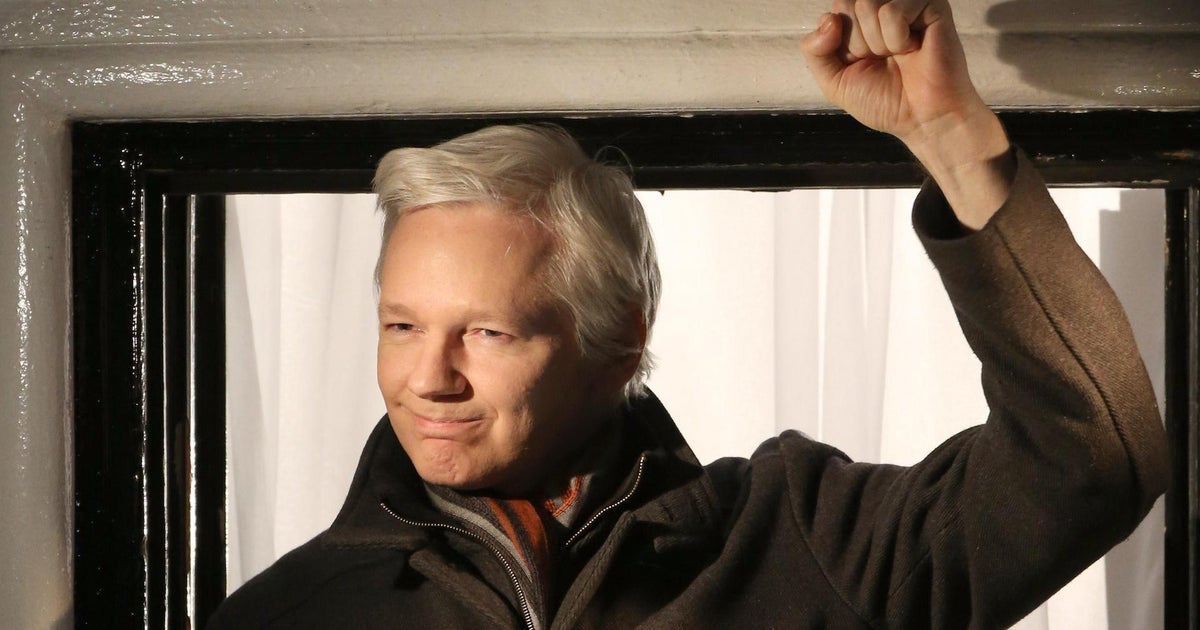CBS News
Julian Assange, WikiLeaks founder, given chance to appeal against U.S. extradition by U.K. court

London — A U.K. court has ruled that Julian Assange will not be immediately extradited to face charges in the United States, giving the U.S. government three weeks to “offer assurances” that the American justice system will abide by several specific tenets in its handling of the WikiLeaks founder’s case.
The British court said Assange “has a real prospect of success on 3 of the 9 grounds of appeal” he has argued. Specifically, the court demanded that U.S. justice officials confirm he will be “permitted to rely on the First Amendment to the United States Constitution (which protects free speech), that he is not prejudiced at trial (including sentence) by reason of his nationality, that he is afforded the same First Amendment protections as a United States citizen and that the death penalty is not imposed.”
The court said that if those U.S. government assurances are not given within the three week timeframe, Assange will be granted leave appeal in the U.K. If the assurances are given, there will be another U.K. court hearing on May 20 to make a final decision on granting Assange leave to appeal.
“Mr. Assange will not, therefore, be extradited immediately,” the court said in its judgment on Tuesday.
Matt Dunham/AP
This is the final appeal option available to Assange in U.K. courts.
He can, however, if the appeals process in the U.K. is exhausted, file an appeal with the European Court of Human Rights to consider his case. That court could order the U.K. not to extradite him as it deliberates. An appeal to the European Court of Human Rights would be Assange’s final option to try to prevent his extradition to the U.S.
Assange has been imprisoned for almost five years in the U.K., and spent many years before that avoiding U.K. authorities by holing himself up in the Ecuadorian Embassy in London.
If extradited to the U.S., Assange faces a potential 175 years in prison for publishing classified information about the wars in Afghanistan and Iraq on the WikiLeaks website.
What are the U.S. charges against Assange?
WikiLeaks published thousands of leaked documents, many relating to the wars in Iraq and Afghanistan, and Assange is alleged to have conspired to obtain and disclose sensitive U.S. national defense information.
In 2019, a federal grand jury in Virginia indicted Assange on 18 charges over the publication of classified documents. The charges include 17 counts of espionage and one charge of computer intrusion. Assange could face up to 10 years in prison for every count of espionage he’s convicted of, and five years for the computer intrusion charge, according to the Department of Justice.
In a statement, the U.S. Department of Justice said Assange was complicit in the actions of Chelsea Manning, a former U.S. Army intelligence analyst, in “unlawfully obtaining and disclosing classified documents related to the national defense.”
Assange denies any wrongdoing, and his lawyer says his life is at risk if he is extradited to the U.S.
CBS News
Houston father desperate for help after wife recovering from C-section, kids deported to Mexico

Watch CBS News
Be the first to know
Get browser notifications for breaking news, live events, and exclusive reporting.
CBS News
Are gold ETFs a good investment now that the price is dropping?

Getty Images
Gold has long served as a safe-haven asset for investors during times of economic uncertainty and market volatility, which is a large part of why it has been so popular over the past year. Thanks to that uptick in gold interest, the price of gold has been climbing throughout much of 2024 — hitting multiple record highs and surpassing $2,700 per ounce at one point late in the year. That price trend has been shifting lately, though, and over the last few weeks, there have been significant fluctuations in gold prices, with the price of gold dropping over the last few days in particular.
With gold’s price currently sitting at under $2,650 per ounce, today’s lower price is prompting many investors to reassess their positions in gold-related investments — including gold exchange-traded funds (ETFs). These investment vehicles, which track the price of gold without requiring physical ownership of the precious metal, have become increasingly popular among retail and institutional investors alike. Much of the appeal of gold ETFs lies in their simplicity and accessibility. Unlike physical gold, these funds can be easily bought and sold through standard brokerage accounts, offering investors a convenient way to gain exposure to gold price movements.
But while the current price dip could present a good opportunity to buy into gold at a discount, it makes sense to remain cautious about any type of investment right now. So is investing in gold ETFs still a good strategy now that the price of gold is slipping?
Find out how to add gold to your portfolio today.
Are gold ETFs a good investment now that the price is dropping?
When gold prices drop, it can create opportunities for investors to buy at a lower cost, potentially increasing their returns if prices rebound. Gold ETFs provide an easy way to capitalize on this strategy. Unlike physical gold, ETFs can be traded on stock exchanges just like equities, offering liquidity and convenience. They also eliminate the need for storage and security concerns associated with owning physical gold.
There are also a few other reasons to consider investing in gold ETFs despite the current price drops. For starters, gold ETFs offer an efficient way to implement dollar-cost averaging during price dips. By regularly investing fixed amounts, investors can potentially lower their average purchase price over time. This strategy can be particularly effective during periods of price volatility, allowing investors to accumulate positions at various price points.
And while gold prices may be dipping now, it’s unlikely that today’s lower prices will remain the status quo over the longer term. Gold prices have historically rebounded and grown over longer time horizons, so while the current price may be lower than it was a few weeks ago, it could represent a good entry point for long-term investors. That’s particularly true if the fundamental factors supporting gold prices remain intact, such as inflation concerns, currency devaluation risks and global economic uncertainties.
However, investors should consider that there are risks to investing in gold ETFs. One issue is that gold ETFs are subject to market volatility and may not provide immediate returns — so it’s important to make any investing decision based on your unique investment goals and strategy. Gold also generates no income or dividends, making it a pure price appreciation play. The opportunity cost of holding gold ETFs also becomes more significant in high-rate environments where yield-generating investments become more attractive.
Diversify your investments by adding gold to your portfolio now.
Who should invest in gold ETFs now?
While investing in gold ETFs may not make sense for all investors right now, it could be particularly suitable for certain types. For example, investors who need to diversify their portfolios may find gold ETFs attractive, as gold has historically shown a low correlation with traditional asset classes like stocks and bonds. So, the current price drop could present an opportunity to achieve portfolio diversification at more favorable prices.
Risk-conscious investors who are looking to hedge against inflation, currency risks or geopolitical uncertainties might also want to consider adding gold ETF exposure. After all, with the uptick in inflation over the last few months, gold’s historical role as a store of value remains relevant right now, despite the potential for short-term price volatility. Long-term investors might also find current prices attractive in terms of building strategic positions.
However, short-term traders and income-focused investors may want to exercise caution when it comes to gold ETFs. Gold’s price volatility can make short-term trading challenging, while the lack of yield may not align with income-oriented investment objectives.
The bottom line
The current drop in gold prices presents an intriguing opportunity for investors who are interested in gold ETFs, but it’s essential to weigh the potential risks and rewards of this type of gold investing carefully. Gold ETFs offer a convenient and liquid way to gain exposure to gold, making them a viable option for many investors, but they are just one of several ways to invest in this precious metal. Whether or not gold ETFs are the right choice for you will ultimately depend on your investment objectives, risk tolerance and overall portfolio strategy, so before you buy in, do your homework to make sure your decision aligns with your long-term goals.
CBS News
NASA again delays return of Boeing Starliner crew

Watch CBS News
Be the first to know
Get browser notifications for breaking news, live events, and exclusive reporting.











